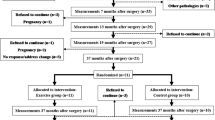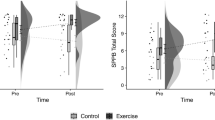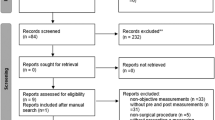Abstract
Background:
Bariatric surgery is effective for the treatment of stage II and III obesity and its related diseases, although increasing evidence is showing weight regain ~12–24 months postsurgery. Weight regain increases the risk of physical function decline, which negatively affects an individual's ability to undertake activities of daily living. The study assessed the effects of a 12-week supervised exercise intervention on physical function and body composition in patients between 12 and 24 months post bariatric surgery.
Methods:
Twenty-four inactive adult bariatric surgery patients whose body mass index remained ⩾30 kg m2 12 to 24 months post surgery were randomised to an exercise intervention (n=12) or control group (n=12). Supervised exercise consisted of three 60-min gym sessions per week of moderate intensity aerobic and resistance training for 12 weeks. Control participants received usual care. The incremental shuttle walk test (ISWT) was used to assess functional walking performance after the 12-week exercise intervention, and at 24 weeks follow-up. Measures of anthropometric, physical activity, cardiovascular and psychological outcomes were also examined. Using an intention-to-treat protocol, independent t-tests were used to compare outcome measures between groups.
Results:
Significant improvements in the exercise group were observed for the ISWT, body composition, physical function, cardiovascular and self-efficacy measures from baseline to 12 weeks. A large baseline to 12-week change was observed for the ISWT (exercise: 325.00±117.28 m; control: 355.00±80.62 m, P<0.001). The exercise group at 24 weeks recorded an overall mean improvement of 143.3±86.6 m and the control group recorded a reduction of −32.50±75.93 m. Findings show a 5.6 kg difference between groups in body mass change from baseline to 24 weeks favouring the exercise group.
Conclusions:
A 12-week supervised exercise intervention led to significant improvements in body mass and functional walking ability post intervention, with further improvements at the 24-week follow-up.
This is a preview of subscription content, access via your institution
Access options
Subscribe to this journal
Receive 12 print issues and online access
$259.00 per year
only $21.58 per issue
Buy this article
- Purchase on Springer Link
- Instant access to full article PDF
Prices may be subject to local taxes which are calculated during checkout


Similar content being viewed by others
References
Colquitt JL, Picot J, Loveman E, Clegg AJ . Surgery for obesity. Cochrane Database Syst Rev 2009; 15: 1–243.
Sjöström L, Lindroos AK, Peltonen M, Torgerson J, Bouchard C, Carlsson B et al. Lifestyle, diabetes, and cardiovascular risk factors 10 years after bariatric surgery. N Engl J Med 2004; 351: 2683–2693.
Courcoulas AP, Christian NJ, Belle SH, Berk PD, Flum DR, Garcia L et al. Weight change and health outcomes at 3 years after bariatric surgery among individuals with severe obesity. J Am Med Assoc 2013; 310: 2416–2425.
Magro DO, Geloneze B, Delfini R, Pareja BC, Callejas F, Pareja JC . Long-term weight regain after gastric bypass: a 5-year prospective study. Obes Surg 2008; 18: 648–651.
Steele T, Cuthbertson DJ, Wilding JP . Impact of bariatric surgery on physical functioning in obese adults. Obes Rev 2015; 16: 248–258.
Shah M, Simha V, Garg A . Long-term impact of bariatric surgery on body weight, comorbidities, and nutritional status. J Clin Endocrinol Metab 2006; 91: 4223–4231.
National Institute for Health and Care Excelence (NICE). Obesity: identification, assessment and management of overweight and obesity in children, young people and adults. In: NICE Clinical Guideline, 189 edn. NICE, 2014.
Josbeno DA, Jakicic JM, Hergenroeder A, Eid GM . Physical activity and physical function changes in obese individuals after gastric bypass surgery. Surg Obes Relat Dis 2010; 6: 361–366.
Stegen S, Derave W, Calders P, Van Laethem C, Pattyn P . Physical fitness in morbidly obese patients: effect of gastric bypass surgery and exercise training. Obes Surg 2011; 21: 61–70.
Castello V, Simões RP, Bassi D, Catai AM, Arena R, Borghi-Silva A . Impact of aerobic exercise training on heart rate variability and functional capacity in obese women after gastric bypass surgery. Obes Surg 2010; 21: 1739–1749.
Coen PM, Tanner CJ, Helbling NL, Dubis GS, Hames KC, Xie H et al. Clinical trial demonstrates exercise following bariatric surgery improves insulin sensitivity. J Clin Invest 2015; 125: 248–257.
Williams MA, Haskell WL, Ades PA, Amsterdam EA, Bittner V, Franklin BA et al. Resistance exercise in individuals with and without cardiovascular disease: 2007 update. A Scientific Statement from the American Heart Association Council on Clinical Cardiology and Council on Nutrition, Physical Activity, and Metabolism. Circulation 2007; 116: 572–584.
Lewis ME, Newall C, Townend JN, Hill SL, Bonser RS . Incremental shuttle walk test in the assessment of patients for heart transplantation. Heart 2001; 86: 183–187.
MacSween A, Brydson G, Creed G, Capell HA . A preliminary validation of the 10-metre incremental shuttle walk test as a measure of aerobic capacity in women with rheumatoid arthritis. Physiotherapy 2001; 87: 38–44.
Kushner RF, Kunigk A, Alspaugh M, Andronis PT, Leitch CA, Schoeller DA . Validation of bioelectrical-impedance analysis as a measurement of change in body composition in obesity. Am J Clin Nutr 1990; 52: 219–223.
Santos-Lozano A, Marin PJ, Torres-Luque G, Ruiz JR, Lucia A, Garatachea N . Technical variability of the GT3X accelerometer. Med Eng Phys 2012; 34: 787–790.
Freedson PS, Melanson E, Sirard J . Calibration of the Computer Science and Applications, Inc. accelerometer. Med Sci Sports Exerc 1998; 30: 777–781.
Bond DS, Phelan S, Wolfe LG, Evans RK, Meador JG, Kellum JM et al. Becoming physically active after bariatric surgery is associated with improved weight loss and health-related quality of life. Obesity 2008; 17: 78–83.
Bandura A . Self-Efficacy Beliefs of Adolescents. Information Age Publishing Inc.: Charlotte, NC, USA, 2006.
Gersovitz M, Madden JP, Smiciklas-Wright H . Validity of the 24-hr. dietary recall and seven-day record for group comparisons. J Am Diet Assoc 1978; 73: 48–55.
Singh SJ, Jones PW, Evans R, Morgan MD . Minimum clinically important improvement for the incremental shuttle walking test. Thorax 2008; 63: 775–777.
Singh SJ, Morgan MD, Hardman AE, Rowe C, Bardsley PA . Comparison of oxygen uptake during a conventional treadmill test and the shuttle walking test in chronic airflow limitation. Eur Respir J 1994; 7: 2016–2020.
World Health Organisation (WHO). Global strategy on diet, physical activity and health In: Physical Activity and Adults—Recommended Levels of Physical Activity for Adults Aged 18–64 Years: WHO: Geneva, Switzerland, 2015.
De Feo P . Is high-intensity exercise better than moderate-intensity exercise for weight loss? Nutr Metab Cardiovasc Dis 2013; 23: 1037–1042.
King WC, Hsu JY, Belle SH, Courcoulas AP, Eid GM, Flum DR et al. Pre- to postoperative changes in physical activity: report from the longitudinal assessment of bariatric surgery-2 (LABS-2). Surg Obes Relat Dis 2012; 8: 522–532.
American Society of Metabolic and Bariatric Surgery. ASMBS Public and Professional Education Committee Bariatric Surgery: Postoperative Concerns, 2008. Report no. http://s3.amazonaws.com/publicASMBS/GuidelinesStatements/Guidelines/asbs_bspc.pdf.
Huck CJ . Effects of supervised resistance training on fitness and functional strength in patients succeeding bariatric surgery. J Strength Cond Res 2014; 29: 589–595.
Castello V, Simões PR, Beltrame T, Bassi D, Maria Catai A, Arena R et al. Effects of aerobic exercise training on variability and heart rate kinetic during submaximal exercise after gastric bypass surgery—a randomized controlled trial. Disabil Rehabil 2013; 35: 334–342.
Marchesi F, De Sario G, Reggiani V, Tartamella F, Giammaresi A, Cecchini S et al. Road running after gastric bypass for morbid obesity: rationale and results of a new protocol. Obes Surg 2015; 25: 1162–1170.
Das SK, Roberts SB, McCrory MA, Hsu LKG, Shikora SA, Kehayias JJ et al. Long-term changes in energy expenditure and body composition after massive weight loss induced by gastric bypass surgery. Am J Clin Nutr 2003; 78: 22–30.
O'Brien PE, McPhail T, Chaston TB, Dixon JB . Systematic review of medium-term weight loss after bariatric operations. Obes Surg 2006; 16: 1032–1040.
Herring LY, Wagstaff C, Scott A . The efficacy of 12 weeks supervised exercise in obesity management. Clin Obes 2014; 4: 220–227.
Bond DS, Evans RK, DeMaria E, Wolfe L, Meador J, Kellum J et al. Physical activity and quality of life improvements before obesity surgery. Am J Health Behav 2006; 30: 422–434.
Bond DS, Vithiananthan S, Thomas JG, Trautvetter J, Unick JL, Jakicic JM et al. Bari-Active: a randomized controlled trial of a preoperative intervention to increase physical activity in bariatric surgery patients. Surg Obes Relat Dis 2015; 11: 169–177.
Acknowledgements
The research was supported by the National Institute for Health Research (NIHR) Leicester-Loughborough Diet, Lifestyle and Physical Activity Biomedical Research Unit, which is a partnership between University Hospitals of Leicester NHS Trust, Loughborough University and the University of Leicester; the NIHR Collaboration for Leadership in Applied Health Research and Care—East Midlands (NIHR CLAHRC—EM), and the Leicester Clinical Trials Unit. The views expressed are those of the author(s) and not necessarily those of the NHS, the NIHR or the Department of Health.
Author information
Authors and Affiliations
Corresponding author
Ethics declarations
Competing interests
Professor MJD has acted as consultant, advisory board member and speaker for Novo Nordisk, Sanofi-Aventis, Lilly, Merck Sharp and Dohme, Boehringer Ingelheim, AstraZeneca and Janssen and as a speaker for Mitsubishi Tanabe Pharma Corporation. She has received grants in support of investigator and investigator initiated trials from Novo Nordisk, Sanofi-Aventis and Lilly. Professor SJHB reports that funding has been received since 2013 for consultancy work from Fitness First, Nuffield Health and Unilever. None of these are currently active. Funding was received in 2016 for consultancy work for Halpern Limited. In-kind support through the provision of a sit-to-stand desk was provided by Ergotron from 2012 to 2014. Advice has been requested by and offered to Active Working, Get Britain Standing and Bluearth, none with funding. DJB reports grants and non-financial support from Fresenius-Kabi, non-financial support from Nutricia, outside the submitted work. The other authors declare no conflict of interest.
Rights and permissions
About this article
Cite this article
Herring, L., Stevinson, C., Carter, P. et al. The effects of supervised exercise training 12–24 months after bariatric surgery on physical function and body composition: a randomised controlled trial. Int J Obes 41, 909–916 (2017). https://doi.org/10.1038/ijo.2017.60
Received:
Revised:
Accepted:
Published:
Issue Date:
DOI: https://doi.org/10.1038/ijo.2017.60
This article is cited by
-
Impact of a Multicomponent Exercise Training Program on Muscle Strength After Bariatric Surgery: A Randomized Controlled Trial
Obesity Surgery (2024)
-
Usual dietary intake, physical activity, weight loss, and body composition after five years of Roux-en-Y gastric bypass
International Journal of Obesity (2023)
-
Physical activity and exercise for weight loss and maintenance in people living with obesity
Reviews in Endocrine and Metabolic Disorders (2023)
-
Fostering physical activity-related health competence after bariatric surgery with a multimodal exercise programme: A randomised controlled trial
Journal of Behavioral Medicine (2023)
-
Strategie di mantenimento del calo ponderale nel paziente con obesità
L'Endocrinologo (2023)



